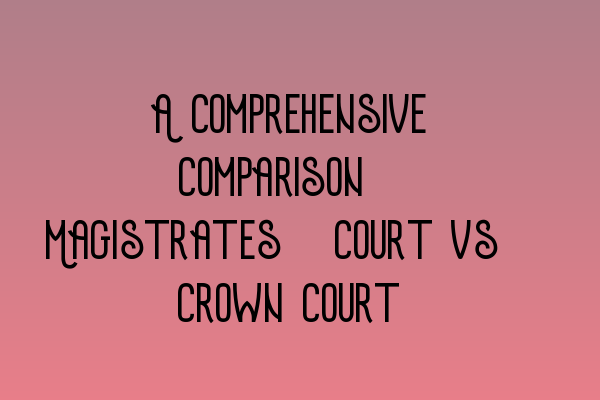A Comprehensive Comparison: Magistrates’ Court vs. Crown Court
When it comes to criminal law proceedings in the UK, cases can be heard in either Magistrates’ Court or Crown Court. Each court has its own distinct characteristics and processes, which can significantly impact the outcome of a case. In this comprehensive comparison, we will delve into the similarities and differences between Magistrates’ Court and Crown Court, helping you understand the key factors to consider when facing criminal charges.
The Basics: Magistrates’ Court
Magistrates’ Court is the first point of contact for the majority of criminal cases in the UK. It handles less serious offenses, also known as summary offenses. A panel of three lay magistrates or a district judge, known as a stipendiary magistrate, presides over the proceedings.
One of the key advantages of Magistrates’ Court is its accessibility. Cases are usually heard in local courthouses, removing the need for extensive travel. This can be particularly beneficial for defendants and witnesses who may face difficulties attending court due to distance or other factors.
Magistrates’ Court trials are typically faster than Crown Court trials, thanks to their streamlined process. This helps ensure a more efficient justice system by reducing the backlog of cases. Additionally, the costs associated with Magistrates’ Court proceedings are generally lower for both the defendant and the state, making it a more cost-effective option.
However, it is important to note that Magistrates’ Court has limited sentencing powers. It can only impose penalties of up to 12 months’ imprisonment for a single offense or 6 months’ imprisonment for multiple offenses. More serious cases are referred to Crown Court for sentencing.
The Basics: Crown Court
Crown Court deals with more serious criminal cases, often known as indictable offenses. These cases are heard before a judge and a jury of 12 individuals. The role of the judge is to provide legal guidance during the trial, while the jury decides on the defendant’s guilt or innocence.
Crown Court hearings typically take place in larger city-based courtrooms, which may be less convenient for defendants and witnesses residing outside these areas. However, the advantage of Crown Court lies in its discretion when it comes to sentencing. The judge has broader powers and can impose longer custodial sentences and higher fines than Magistrates’ Court.
Furthermore, cases tried in Crown Court tend to receive more media attention due to their gravity and potential impact on society. This can be both a disadvantage and an advantage. On one hand, media coverage may lead to a biased jury or prejudice against the defendant, but on the other hand, it can also bring attention to important legal issues and encourage justice to be served.
Which Court is Right for You?
Now that we have explored the basics of Magistrates’ Court and Crown Court, the question arises: which court is right for your case? The answer depends on several factors, including the severity of the offense, the desired outcome, and personal circumstances.
If you are facing a less serious offense, the Magistrates’ Court may be a suitable option due to its accessibility, speed, and cost-effectiveness. However, if the offense is more severe and you believe a jury trial or a more experienced judge is necessary, you may opt for Crown Court proceedings.
It is important to consult with an experienced criminal law solicitor to assess your specific circumstances and determine the best course of action. SQE Criminal Law & Practice Law UK can provide expert advice and representation, ensuring your case is handled professionally and effectively.
In conclusion, both Magistrates’ Court and Crown Court play vital roles in the UK criminal justice system. Each court offers distinct advantages and considerations, which should be carefully evaluated when facing criminal charges. By understanding the differences between these courts and seeking expert legal advice, you can navigate the legal process with confidence and increase your chances of a successful outcome.
For more information on criminal law, SQE exams, and preparation courses, check out the following related articles:
- SQE 1 Practice Exam Questions
- SQE 1 Practice Mocks FLK1 FLK2
- SQE 2 Preparation Courses
- SQE 1 Preparation Courses
- SRA SQE Exam Dates
Remember, choosing the right legal representation and understanding the court system can make a significant difference in your case. Trust SQE Criminal Law & Practice Law UK to guide you through the complexities of the criminal justice system and provide you with the best possible outcome.
